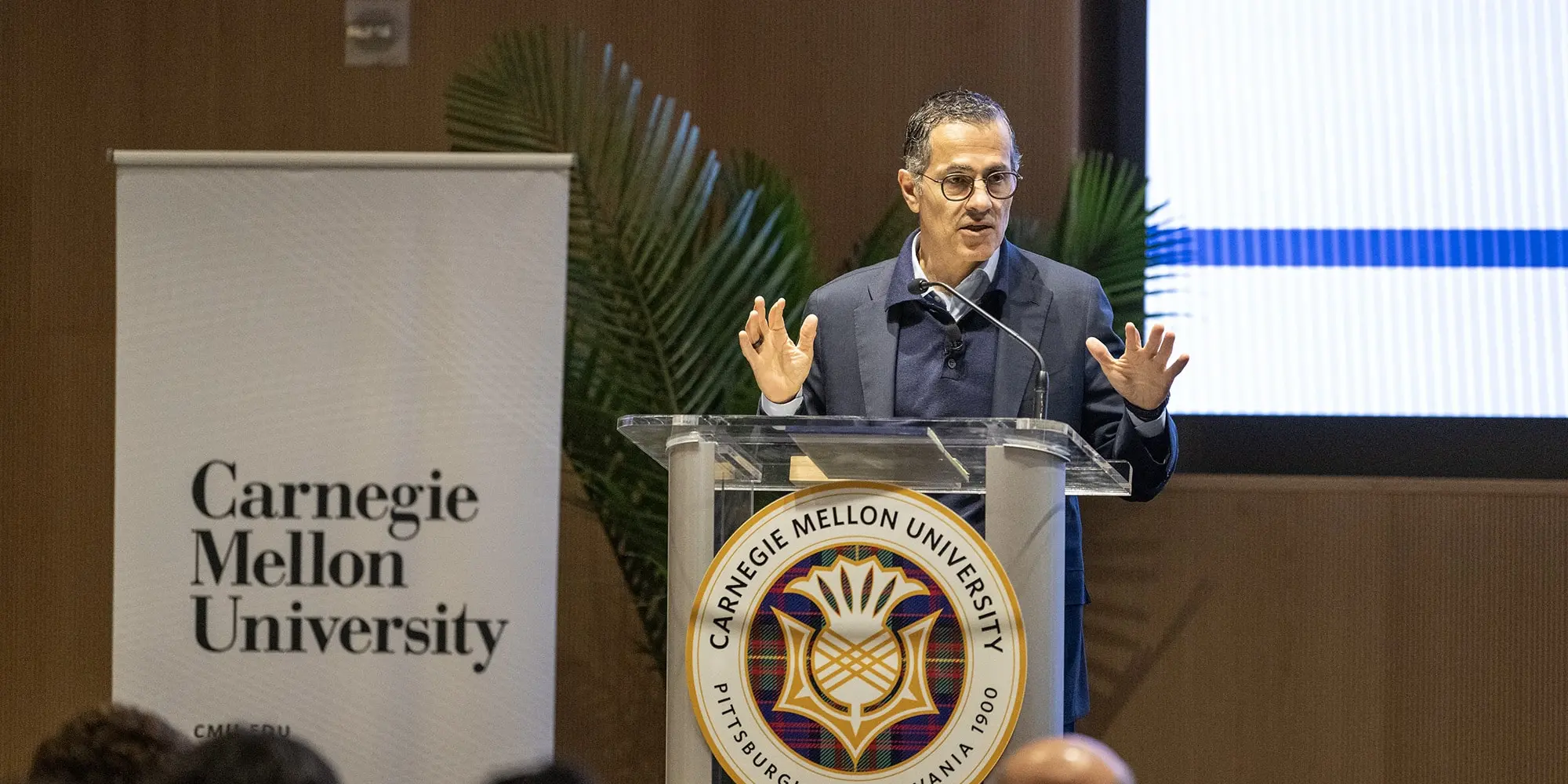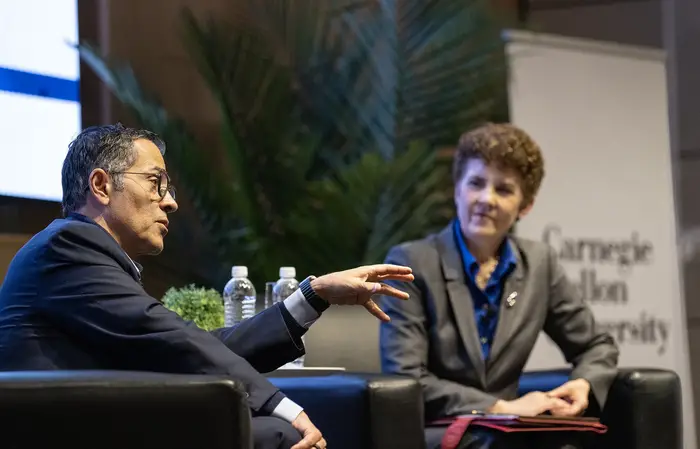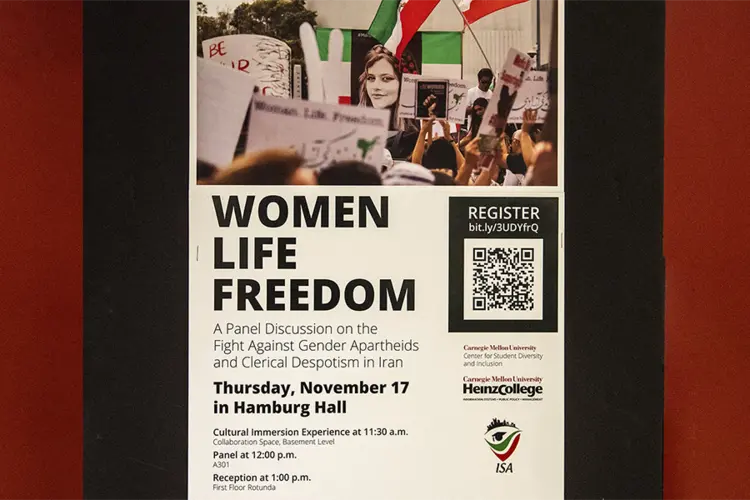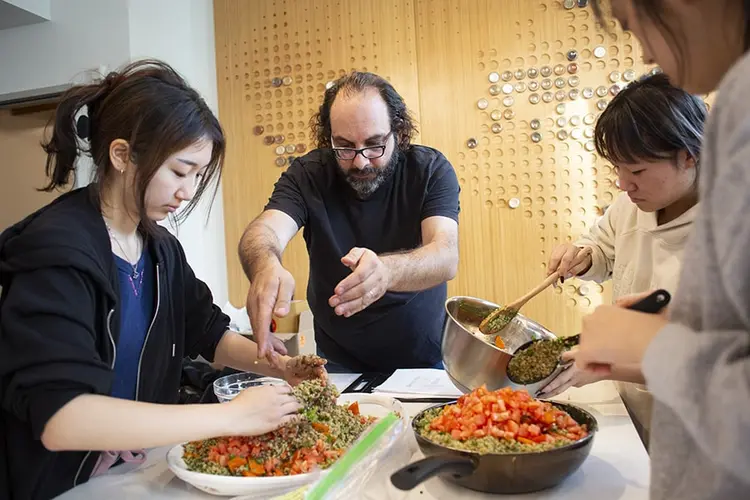
Leading Scholar Provides Perspective on Iran and its Future in CMU Lecture
Media Inquiries
When viewing Iran through the lens of the social sciences, the Middle Eastern country is anomalous and difficult to put into any one box, scholar Vali Nasr told an audience at Carnegie Mellon University on Tuesday.
“Its revolution was counterintuitive when it happened, in the country that it happened, at the time that it happened,” Nasr said. “There was nothing about it that the social sciences would have predicted.”
Nasr made his remarks as part of a lecture titled “The Islamic Republic Under Siege: What is Next for Iran?” presented as part of the University Lecture Series(opens in new window) at the Institute for Politics and Strategy(opens in new window). He is the Majid Khadduri Professor of Middle East Studies and International Affairs at the Johns Hopkins University School of Advanced International Studies. He was introduced by CMU President Farnam Jahanian(opens in new window).

CMU President Farnam Jahanian greets Vali Nasr after introducing him.
Iran’s development over the past 40 years also has been atypical, Nasr added, as is its current situation: in a standoff with the West over its nuclear ambitions and its human rights record under a theocracy that has managed to survive for decades despite brutal economic sanctions.
“It’s not as simple, in my opinion, as thinking of it as post-Berlin Wall 1989 in Europe; it is difficult to see it as part of the Arab Spring,” Nasr continued. “Iran is in many ways a sui generis case.” And, it’s at a particularly fraught moment in its history, he said, because he believes it’s unlikely the Islamic Republic can continue it in its current form.
“Social scientists would say this is a revolution that hasn’t finished,” he said. He compared revolutions — like the one that overthrew the shah of Iran in 1979 and led to the Islamic Republic — to volcanic eruptions. “Ultimately they become rock and solidify, and it ends. But how it will calcify remains to be seen.”
Over the past year, Nasr said, Iran has seen a new generation push back against some of the Islamic Republic’s strict social policies. In September 2022, Mahsa Amini, a young Iranian woman, died after being detained by Iran's morality police, which is tasked with enforcing the country’s rigid dress code. Under the code, women are required to wear hijab, or headscarves, and after Amini’s death, many Iranian women burned their hijabs in public protests that rocked the country.
“I think we’re in a very difficult spot. Everybody would prefer if there was some pathway forward. But nobody can get there.” — Vali Nasr
The Islamic Republic is in the most profound and pervasive crisis of legitimacy since it was established, Nasr said, partly because of some of its authoritarian policies and treatment of women and minorities, but also because its young population is made up of well-educated, digital natives who are more connected globally than their parents.
In the decade leading to the Iran nuclear agreement of 2015, the country saw a period of investment in infrastructure in roads, railways and utilities, Nasr noted, outperforming many of its neighbors.
But when former President Trump pulled the U.S. out of the deal in 2018, Iran continued work on its nuclear program. “And in the process, it has gained a lot more knowledge capital that is not as easy to dismantle,” Nasr said. He added that it would be difficult to get Iran back to the negotiating table with the U.S. because any trust that was established during the 2015 deal is essentially gone.
Audrey Kurth Cronin(opens in new window), Director of the Institute for Politics and Strategy at CMU, asked Nasr during a Q&A after his lecture what he would do if he were secretary of state.
“There is a gap of trust that has to be covered,” Nasr said, if any future talks over a nuclear deal would come to pass. Given the current climate in Iran, he added it would be hard for an American president to justify reopening conversations, let alone negotiating. “I think we’re in a very difficult spot. Everybody would prefer if there was some pathway forward. But nobody can get there.”
Cronin then asked Nasr for his opinion on what the international community could or should do to support the citizens of Iran.
"For people of goodwill, in the United States — with all the arguments about foreign intervention being the cause of the protests — how can the United States and people who are watching this excruciating situation unfold, how can we behave?" she asked.
Nasr replied that the Iranian government blaming foreign intervention for its problems was nothing new. "But whether people are actually in the streets every day or not does not mean that the issues have gone away."



